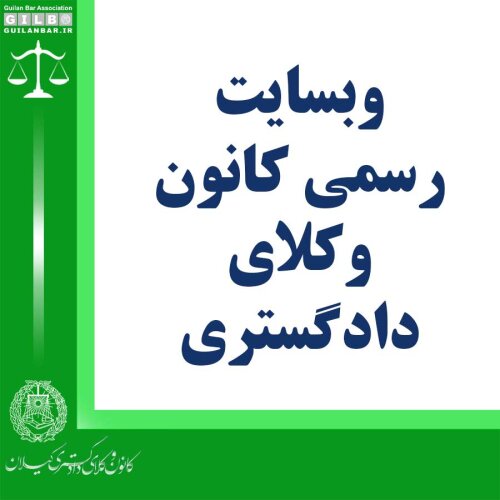Best Arrests & Searches Lawyers in Rasht
Share your needs with us, get contacted by law firms.
Free. Takes 2 min.
List of the best lawyers in Rasht, Iran
About Arrests & Searches Law in Rasht, Iran
Arrests and searches in Rasht, Iran are governed by Iran's national legal framework with specific application at the local level. The laws are based on the Islamic Penal Code, the Code of Criminal Procedure, and relevant government regulations. In Rasht, like the rest of the country, arrests and searches are generally performed by law enforcement officers, such as the police or agents of the judiciary, and must follow rules that respect individual rights and due process. Understanding these laws is vital for anyone facing arrest or search situations to ensure their rights are upheld throughout the process.
Why You May Need a Lawyer
Facing an arrest or a search procedure in Rasht can be intimidating, especially for those unfamiliar with local laws or not fluent in Persian. Legal assistance is often crucial in several scenarios:
- You have been detained by police or another authority and are unaware of your rights.
- Your home, car, or workplace has been searched or is about to be searched.
- You are facing criminal accusations and worry that the search or arrest was unlawful.
- You believe evidence was obtained incorrectly or procedures were not followed.
- You are representing a family member or friend who has been arrested or is under investigation.
- You wish to file a complaint regarding the behavior of law enforcement during a search or arrest.
A lawyer can clarify your rights, protect your interests, and ensure proper procedures are followed at every stage.
Local Laws Overview
Rasht observes Iranian national laws regarding arrests and searches but local enforcement and judicial practices can vary. Key aspects to keep in mind include:
- Legal Authority: Only authorized officers may carry out arrests and searches, typically with permission from a judicial authority, unless in cases of urgent suspicion.
- Warrants: Search and arrest warrants are usually required, except for certain crimes witnessed directly by authorities or if evidence could be immediately destroyed.
- Rights Upon Arrest: You must be informed of the reason for your arrest. You have the right to remain silent and request legal counsel.
- Search Procedures: Searches must comply with procedural rules to prevent abuses, such as having witnesses present or following gender-specific guidelines.
- Detention Rules: There are strict timelines for how long you may be held without formal charges. Your family usually has the right to know your whereabouts.
- Evidence: Illegally obtained evidence can be challenged in court, though such challenges require legal expertise.
Local practices in Rasht reflect national laws but may vary based on judicial discretion and police procedures, making expert legal guidance highly recommended.
Frequently Asked Questions
What should I do if I am arrested in Rasht?
Remain calm, do not resist, and ask to contact a lawyer as soon as possible. You have the right to know the reason for your arrest.
Can the police search my home without a warrant?
Police generally require a search warrant issued by a judge, unless there is an emergency such as following a suspect or preventing the destruction of evidence.
Do I have the right to remain silent?
Yes, you do have the right to remain silent and not to answer questions until your lawyer is present.
How long can I be detained without charge?
Generally, you cannot be held for more than 24 hours without being officially charged, though extensions are possible with judicial permission.
What is a legal search in Rasht?
A legal search is one that is conducted by authorized officers, usually with a warrant, and follows procedural protections such as the presence of witnesses.
Can I refuse a search?
You may state your refusal, but officers can proceed if they have a warrant or legal grounds under the law. Do not physically resist.
Will my family be informed if I am detained?
Yes, authorities are generally required to notify your family or next of kin unless there are compelling reasons not to do so.
Can evidence collected unlawfully be used against me?
Evidence that is clearly obtained in violation of procedures may be challenged in court, but the process requires legal argument and familiarity with local judicial practices.
What if the police mistreat me during an arrest or search?
You may file a formal complaint with relevant authorities or through your lawyer. Documentation and witness testimony will strengthen your case.
How can a lawyer help me during an arrest or search?
A lawyer protects your rights, ensures procedures are followed legally, challenges any violations, and represents you in any legal proceedings.
Additional Resources
For those seeking further information or support in Rasht, the following resources can be useful:
- The Dadgostari (Judiciary) Office of Rasht for complaints against law enforcement procedures.
- Rasht Police Department's Legal Affairs Unit for queries on actions taken by police.
- Licensed legal aid societies and the local Bar Association for lawyer referrals.
- Judicial Complexes where you can access information on your case status or submit documents.
- NGOs that monitor legal procedures and prisoners' rights.
Next Steps
If you or a loved one is facing an arrest or search in Rasht, consider the following steps:
- Remain calm and cooperate with law enforcement while firmly requesting your right to legal representation.
- Contact a qualified local lawyer as soon as possible for advice or representation.
- Gather and keep any documents or communications related to your case or search warrant for your lawyer's review.
- If you believe your rights were violated, document the details and share them with your legal advisor promptly.
- Reach out to the relevant government offices or legal aid organizations listed above for further support.
- Educate yourself about your rights and obligations to better navigate the legal system during this challenging time.
Seeking professional legal guidance early can make a significant difference in your case and help protect your rights throughout the process.
Lawzana helps you find the best lawyers and law firms in Rasht through a curated and pre-screened list of qualified legal professionals. Our platform offers rankings and detailed profiles of attorneys and law firms, allowing you to compare based on practice areas, including Arrests & Searches, experience, and client feedback.
Each profile includes a description of the firm's areas of practice, client reviews, team members and partners, year of establishment, spoken languages, office locations, contact information, social media presence, and any published articles or resources. Most firms on our platform speak English and are experienced in both local and international legal matters.
Get a quote from top-rated law firms in Rasht, Iran — quickly, securely, and without unnecessary hassle.
Disclaimer:
The information provided on this page is for general informational purposes only and does not constitute legal advice. While we strive to ensure the accuracy and relevance of the content, legal information may change over time, and interpretations of the law can vary. You should always consult with a qualified legal professional for advice specific to your situation.
We disclaim all liability for actions taken or not taken based on the content of this page. If you believe any information is incorrect or outdated, please contact us, and we will review and update it where appropriate.









